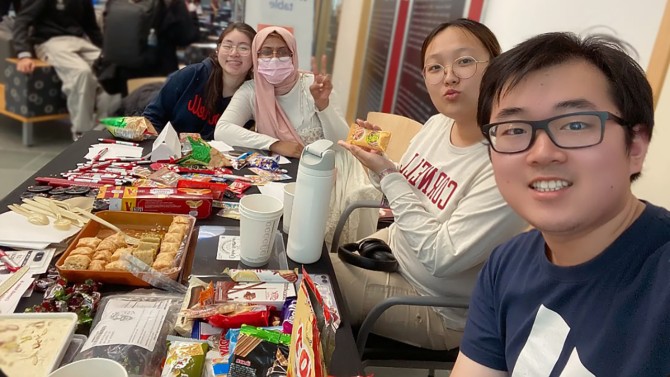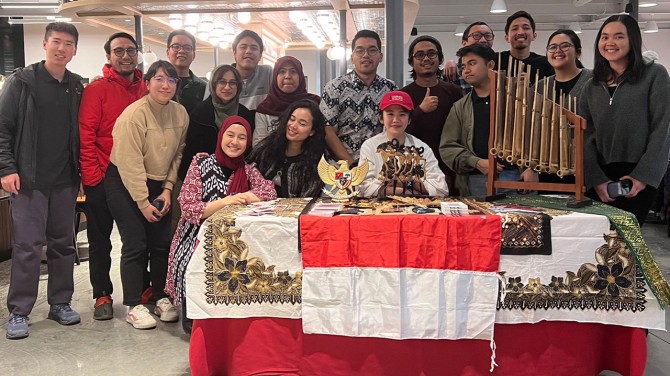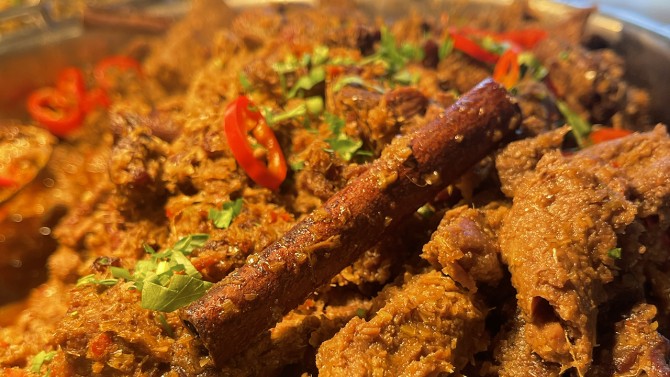
Photo of coconut banana steamed cake from an Indonesian-themed dinner at Morrison Dining.
News directly from Cornell's colleges and centers
Cornell Dining works with students to plan themed dinners
By Ben Badua
Wander into one of Cornell Dining’s eateries and you’ll find flavors and culinary offerings catering to almost every taste. Tuesday nights at Rose House offer a fusion of Mexican and Japanese cuisine in the form of birria ramen. Green curry mussels and Vietnamese Bahn Mi sandwiches are weekly staples at Morrison Dining, while Cook House leans into a theme night that cuts across cultures: cheese.
But while chefs have long incorporated individual dishes into menus that reflect their own culinary styles and backgrounds, Cornell Dining’s operation continues to expand on a broader initiative to diversify its offerings by tapping into the eclectic tastes and experiences of Cornell students.
“Our guests are not leaving the restaurant an hour later or checking out of the hotel in three days,” says executive chef Ambarish Lulay. “They are here for several years, and we have a responsibility to them. Our promise to students is to provide them with tasty, safe, healthy and nutritious food – but we also want them to try new things.”
Cornell Dining offers multiple special culinary events each academic year. Last semester, Morrison dining held a series of theme nights centered on Indian street food, Moroccan, Pakistani, and Indonesian cuisine. To commemorate Black History Month in February, nine eateries hosted 12 dinners exploring traditional dishes of the African Diaspora. And on April 11, West Campus’ five dining rooms will feature Asian cuisine to celebrate Asian Pacific Islander Desi American (APIDA) Heritage Month.
The common thread tying Dining’s efforts to introduce the Cornell community to diverse meals has been the involvement of students. From providing feedback that has helped shape events and programs, to participating in planning, menu development, and in some cases, even the sourcing of ingredients, students have worked together with dining staff to ensure authentic, global flavors are accessible to a campus tucked away in the rural countryside of Central New York.
“We have a very diverse campus and student body,” says Lulay. “We as cooks are part of that community and our way of expressing ourselves isn’t by speaking or performing – it’s through food. Every bite that we put out tells students about our efforts and what we believe in so it’s important that we do whatever we can to ensure they have the best experience.”
Connecting with culture through cuisine
Last year, as a program manager for the Asian and Asian American Center (A3C), Jason Xiong ’25 was tasked with planning events aimed at bringing the APIDA community on campus together. While A3C’s other teams focused on inviting speakers and holding workshops, Xiong wanted to foster connections through cuisine.
For his final event last May, he initially envisioned a food exchange, but logistical concerns and budgetary constraints made organizing a traditional potluck unrealistic. Instead, Xiong settled on a simpler solution and set up a snack table at Duffield Hall. Students visiting the table could try everything from savory, spicy candy to banana milk, tea, and uniquely flavored juice boxes. Wanting to share something from his own culture, Xiong brought a breakfast staple from his youth, pork floss pie – a chiffon-style cake made from dry, fluffy shredded pork sometimes seasoned with a creamy sauce.
“My experience is a little different because I grew up in China,” says Xiong. “But for many Asian Americans, who’ve spent their entire lives here, it can be harder to relate to their culture. Food is the most accessible way for people to connect because even if they don’t speak the language or know all the traditions, they can recognize the food on their dinner tables and be in touch with that side of their culture.”
Now in his second year with the A3C, Xiong serves as one of the student co-chairs for the APIDA Heritage Month Planning Committee. The idea to plan Asian-themed dinners across West Campus’ five dining rooms was the result of a collaboration between the planning committee and Perdita Das-Humphrey. The assistant dean of Hans Bethe House, Das-Humphrey previously worked with dining staff on themed house dinners that often include a learning component that celebrates students’ cultural heritage.
“The approach I try to bring towards inclusivity is for folks to enter a space and see themselves reflected,” says Das-Humphrey. “Food is the one component that is such a daily part of everyone’s life so it’s important to apply that same approach towards inclusivity. Learning also happens when guards are down and you’re sharing a bowl of food. It can be spicy ramen or hot dogs, but conversation is happening, and in some ways, it can be as good of a vessel for learning than a lecture.”
With the help of Das-Humphrey, senior chef Kristopher Angle, and general manager BJ Wojtowicz, Xiong and other members of the heritage month committee began planning the themed dinners’ menus. The committee’s original idea centered on featuring food from various regions. But fearing students might gravitate toward more familiar cuisine, such as East Asian food, the group instead decided to focus on distinct categories and styles of cooking.
“Our goal was to just highlight as many cuisines as we could,” says Xiong. “What we want students to take away from these dinners a broader understanding of what Asian food can look and taste like so that maybe in the future, they’ll want to try something new.”
Xiong and several students compiled a list of foods under five categories: street food, noodles, curries, stir fries, and Asian breakfast for dinner. Over the next several months, the student committee worked with Angle and Wojtowicz to refine the menu based on available ingredients and recipes’ ability to scale.
“This is the first time we’re doing something like this on West Campus and we want students to know they have the ability to come to us with ideas and that we’re listening,” says Wojtowicz. “We’re excited for students to try different cuisines they haven’t seen before, but the important part for us is building relationships and it’s great when members of the dining staff and students get to work together.”
Leaving a legacy
For Iorysiella Kongguasa ’23 it began by sharing a simple meal based on a family recipe. A former culinary assistant at Morrison Dining Hall, Kongguasa made a dish for her fellow cooks that featured caramelized, deep-fried cabbage, that was then stir-fried with scrambled eggs, soy sauce, and garlic. It was such a hit that Kongguasa soon found herself in touch with senior chef Joshua Holden.
“Through the years, we’ve partnered with student workers, and we’ve had Zoom calls with uncles, aunts, and grandparents where we’ve gathered information and recipes,” says Holden. “We create comfort and community through food, and if we’re exploring or celebrating a culture, the most important aspect of that is having people from that culture participate so that we create something authentic.”
As the pair talked about Kongguasa’s love of food from her homeland, an idea was born to host an Indonesian-themed dinner at Morrison. Beginning the planning process in November for a dinner slated for March of 2023, Kongguasa spent the next several months compiling and testing recipes. Spending hours in the kitchen, she’d make small portions for her fellow cooks to try before running trials to see how the dishes would scale to accommodate a typical Morrison dinner service of 2,000 students.
Some recipes translated better than others. While ingredients back in Indonesia were easily accessible, importing them to Ithaca proved to be cost prohibitive. Herbs and spices like galangal root and lime leaves were particularly expensive, so Kongguasa figured out how to use smaller amounts without compromising flavor. Chinese eggplant and bird’s eye chili were pricey in bulk, so the team substituted them with more budget-friendly variations of eggplant and poblano and Jalapeno peppers that mimicked the dishes’ spicy profile. Kongguasa also figured out how to streamline the cooking process through trial and error.
Her dessert, a coconut banana steamed cake, took 10 tries to perfect. Kongguasa’s signature dish, a sweet, soy chicken which is typically cooked in water mixed with spices before being roasted, needed to be marinated instead to handle 400 pounds worth of protein more efficiently. Nine recipes were submitted to Dining’s Culinary Wellness and Innovation (CWI) team in preparation for the themed dinner – all of which remain in Cornell Dining’s recipe bank today.
“When I was there and first looked for an Indonesian recipe, there were none so it’s fulfilling to know I was able to leave a legacy,” says Kongguasa, a nutritional sciences major from the College of Human Ecology who graduated this past December. “I’m just really proud of my country’s food and after that event, I started to cook for my friends more because I just want to continue to share that joy. There’s a lot of cultures in this world that people don’t know much about, and I’d encourage everybody to step up, be brave, and to share.”
Transporting students through food
While Cornell Dining’s operation remains committed to its growing partnership with students like Xiong and Kongguasa, planning large-scale theme nights presents a unique set of challenges. General dining menus are typically set six months in advance. To stay ahead of the curve and avoid issues sourcing unique and often in-demand products, chefs aim to finalize specialty menus at least three months out.
“These collaborations require an extra layer of preparation because these are recipes from someone’s homeland and culture,” says Lulay. “They need to be translated properly and in a way that keeps the integrity and authenticity of the food.”
Then there is the hurdle of scaling new recipes to meet the production needs of an operation that supports nearly 9,000 meal plans and serves almost 27,000 meals a day. Finally, new items are also subject to review by Dining’s CWI team, dieticians, and staff nutritionists to ensure meals meet the department’s menu standards aimed at promoting a healthy, balanced diet. Despite the demands, continued collaboration between Cornell’s chefs and students has helped expose the campus community to a wide array of culinary styles while fostering a sense of belonging.
“Food is very powerful and tends to hit right at the heart of our values,” says Lulay. “We want to give students a sense of where they grew up, remind them of the smells from their kitchen, and from that very first bite, magically transport them to wherever it is they want to go.”
Ben Badua is the Creative Content Manager for Student and Campus Life.
Media Contact
Get Cornell news delivered right to your inbox.
Subscribe


